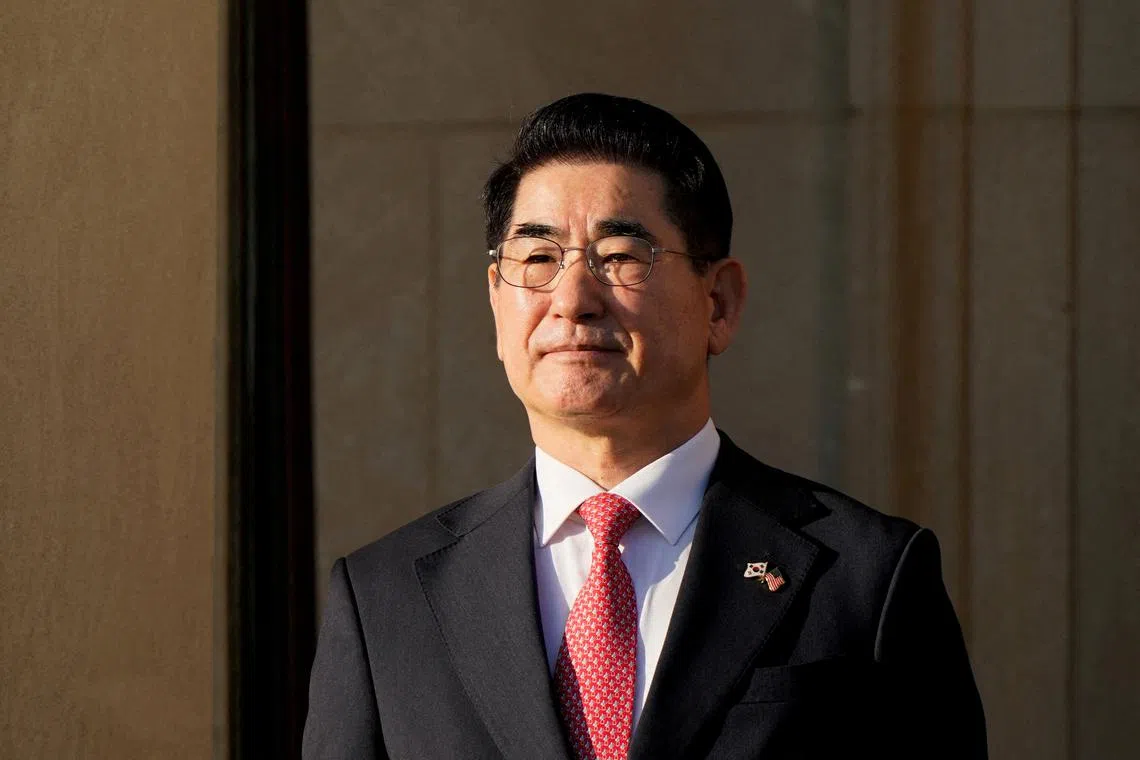Ousted South Korean defence minister testifies Yoon never intended to impose full martial law
Sign up now: Get insights on Asia's fast-moving developments

The former South Korean defence minister Kim Yong-hyun was charged with insurrection.
PHOTO: REUTERS
Follow topic:
SEOUL – The former South Korean defence minister charged with insurrection for his role in a short-lived martial law declaration
Former minister Kim Yong-hyun, who resigned after the Dec 3 martial law incident and is now jailed, testified before the nation’s Constitutional Court, which is deciding whether to reinstate or fully remove Mr Yoon from power
What was central to Mr Yoon’s defence is that he never intended to impose military rule, and he was using the decree only to break political deadlock.
“Yes,” said Kim when asked by Mr Yoon’s lawyers whether the South Korean President had shot down the then Defence Minister’s recommendation to mobilise all military units stationed in Seoul, using around 7,000 to 8,000 troops to seize Parliament.
Kim confirmed he had also proposed sending some units to the opposition party headquarters and a left-wing polling firm.
The Constitutional Court began its trial on Dec 27 to review charges that Mr Yoon violated his constitutional duty by imposing martial law without justification.
At an earlier hearing, the Parliament’s legal team presented testimony from military commanders and video footage showing military helicopters landing on Parliament grounds with special forces troops breaking into the main building, as well as troops moving in on the National Election Commission.
An opposition Democratic Party lawmaker had condemned “the Dec 3 insurrection”, saying Mr Yoon and supporters sought chaos by refusing to accept his recent arrest warrant.
On Jan 23, South Korea’s anti-corruption agency transferred its case to prosecutors, recommending they indict Mr Yoon for insurrection and abuse of power.
The former commander of the Army Special Warfare Command, Mr Kwak Jong-geun, told a Parliament committee in December that he received multiple telephone calls from Mr Yoon as events unfolded, including an order to “drag out” lawmakers from Parliament.
Mr Kwak, who has since been indicted on insurrection charges, said he chose not to execute that order.
When asked about that report by a Constitutional Court justice on Jan 21, Mr Yoon denied giving such a command.
The testimony by Mr Kwak differed from earlier statements by military officers that it was Kim who gave the order to extract lawmakers from Parliament’s chambers.
On Jan 23, Kim conceded he had proposed declaring martial law to Mr Yoon. He said the South Korean President was concerned that the opposition party was obsessed with only three things – protecting the opposition leader from legal liabilities, impeaching government officials and launching special counsel investigations against Mr Yoon.
He quoted Mr Yoon as saying that the opposition’s “parliamentary dictatorship and violence had gone out of control”, and left no alternative.
About 1,605 soldiers and 3,144 police officers were deployed to locations including the National Assembly and the National Election Commission, according to indictments against army commanders reviewed by Reuters.
Some of them entered the Parliament building itself, including by breaking windows, where they faced off with staff who had used furniture to barricade doors and wielded fire extinguishers.
Mr Yoon rescinded the attempt at martial law six hours later after Parliament defied military and police cordons to vote against the decree.
During the hearing on Jan 23, Mr Yoon disputed suggestions that martial law had been thwarted, saying he always intended it to be a limited operation.
“This wasn’t a failed martial law, it ended a little sooner than expected, as the National Assembly quickly demanded the lifting of it, and I also ordered the withdrawal of the military,” he said.
Kim said he shared names of people who might violate the decree with the defence counter-intelligence commander on Dec 3, but that it was not an arrest list.
Mr Yoon could be seen occasionally nodding at Kim during the testimony. REUTERS

